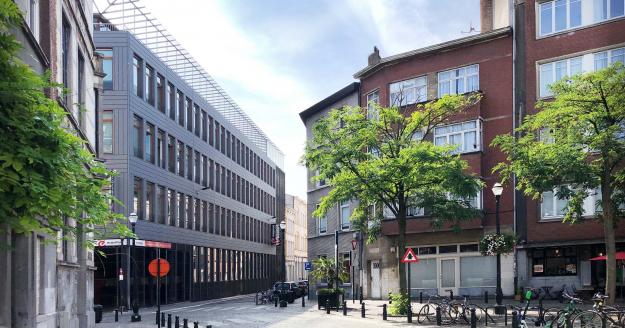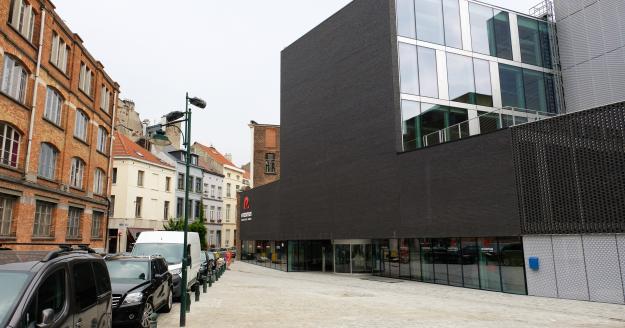
Journalism
Special European Correspondent in Brussels (project)
Affairs Integrated hands on journalism project, in which student-editors create their own multimedia newsroom and produce high quality journalistic print, online, radio and television products. During the three months span of this project the participating student-journalists will be coached by a team of experienced journalists and editors-in-chief. Approved material will be published on the school’s news platforms and thus forwarded to national and international media partners.
The incoming student acts as a special European correspondent in Brussels for his/her home country, whose job it is to report on a daily basis about Brussels, Belgium and Europe. Apart from the school related assignments students are prompted to initiate journalistic activities and/or generate various journalistic products of their own choice. This allows them to specialize and profile in medium and content.
In a separate one-week activity-course incoming students are submerged in the fascinating hustle and bustle of Brussels, capital of Belgium and gateway to Europe (see ‘Introductory course to Bussels’, 3 credits). Furthermore they discover the French speaking part of Belgium with a 3 day exploration (Charleroi, Namur, Liege ...) resulting in a range of multimedia journalistic products on an individual basis, using their smartphones as a means of recording, processing and transmitting.
The separate 3 credits-course ‘European framework and roots’ will provide profound knowledge and understanding of different EU institutions, and the diversity of EU policy-making across a range of policy domains. As special European correspondents for their home countries this will help students identify predominant EU-related patterns, characteristic styles and trends, and other issues that are likely to turn op in their reporting, such as the tensions due to enlargement, the gap between an intergovernmental and supra national approach and the question how to organize the cooperation between the EU countries.
Students will produce and publish multimedia content in our newsrooms and studio’s on campus, but will also submerge in the Brussels European district (EU parliament, EU commission, Press Rooms, Midday Briefings, …) and seek to co-operate with (one of) the actual European correspondents in Brussels.
11
Presentation Skills
This course is taught by a former journalist/TV-presenter and partly takes place in an audiovisual studio. The book ‘Presentation Techniques’ by Van der Laan provides a theoretical basis. As a group; we visit Belgian television and several tv-productions.
3
European Framework and Roots
According to some studies, 80% of the EU member states’ socio-economic legislation is shaped by the EU. In this course we bring the students up to date with a range of core policy challenges facing the European Union, and the ways in which they are being addressed. This course is not about how the EU functions but what it tries to achieve by its different policies. The aim is to provide a detailed picture of the diversity of EU policy-making across a range of policy domains, to identify predominant patterns, and characteristic styles and trends over time.
A historical overview of the birth and grow of the Union will help to understand the problems of this institution. The course will tackle the tensions due to enlargement, the gap between an intergovernmental and supra national approach and the question how to organize the cooperation between the EU countries. An overview of the different EU institutions will be completed with a visit at the EU parliament and the EU commission.
3
Survival Dutch
The aim of the "Survival Dutch" course is to master the basics of the Dutch language, both written and spoken. Starting from everyday situations, you will learn the necessary grammar and vocabulary in order to function in a Dutch speaking environment.
We strongly recommend incoming students to participate in the Survival Dutch course, organized prior to the start of the semester.
Languages of instruction: English and Dutch
3
Current News
Students will have to prove that they keep track of current national and international mediatized news events, particularly those related to the European Union. Reading newspapers and magazines, following news broadcasts on television, radio and online they gradually increase their political, social, economic and cultural stock-in trade. Students will discuss these events and their journalistic background on a monthly bases with a jury of journalists/lecturers Current Affairs.
4
(A Guide to) Navigating the world of AI
Artificial Intelligence or AI is a buzzword today and remains a concept poorly understood, vague, and often approached with fear of the unknown or with false hopes about what can be achieved. The course "Navigating the world of Artificial Intelligence" aims to introduce non-IT students to some of the basic concepts, principles, and techniques that fall under the umbrella term AI and offers a more nuanced understanding on the topic. This course is specifically designed for students with no technical background. This is not a coding course! Instead this is an introductory course that enables students to think critically, creatively and ethically about the implementation of AI technology.
Through exercises, you will be encouraged to investigate the general impact of AI in your own field to then further conceptualize what that could mean for a specific organization within your field. The students are guided through these exercises via online course material and regular discussions with peers.
4
Contact
Address
Erasmushogeschool Brussel
Campus Bloemenhof
Zespenningenstraat 70, 1000 Brussels
Campus Kanal
Slotstraat 28, 1000 Brussel
Contact for Erasmus students
Erasmus Coordinator Journalism: peter.mast@ehb.be
International Office: international.office@ehb.be
International Office - Coordinator for incoming students: karen.laleeuwe@ehb.be






